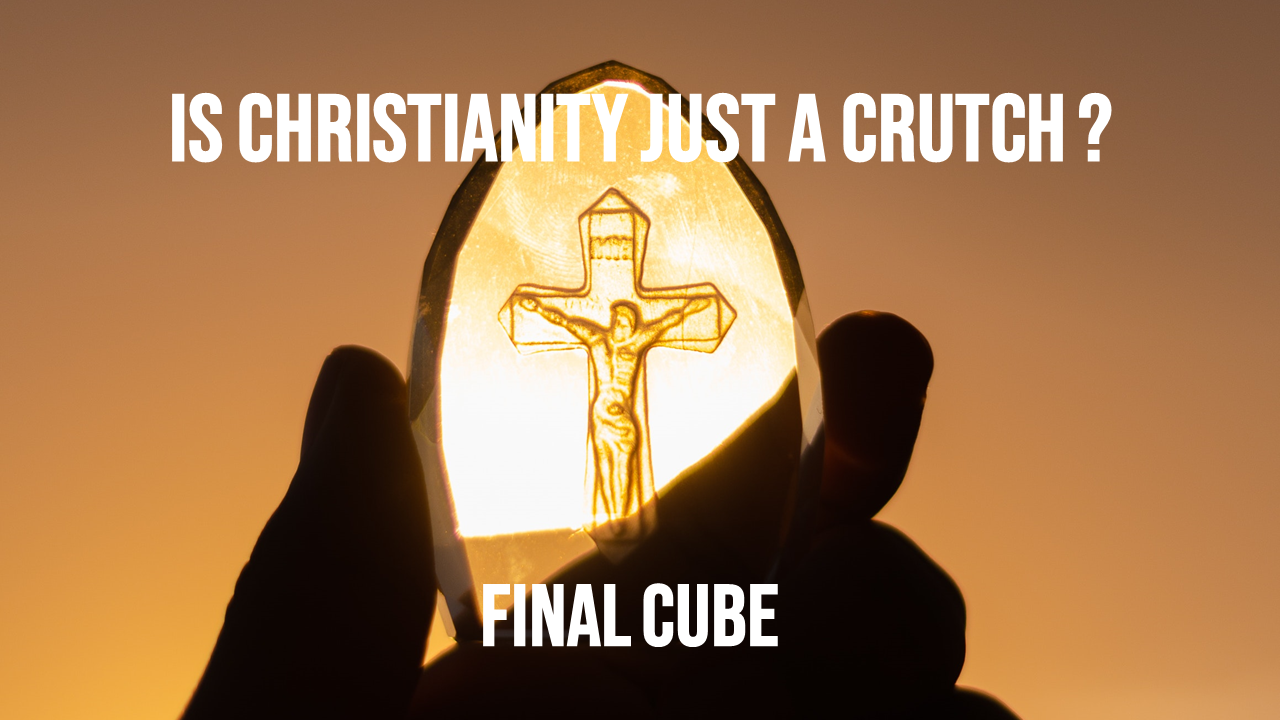
Premise 1 : Belief in God is rational not wish fulfillment
King David who wrote 73 Psalms in the Bible was a wise and powerful King of Israel. David’s reign as King has been attested to by Archeological evidence. The Tel Dan Stele which dates from 835 B.C mentions the “House of David” by name.

In many of David’s Psalms he referenced how the diversity, complexity, order, and beauty of the cosmos was obvious evidence of God.
The heavens tell of the glory of God. The skies display his marvelous craftsmanship. Day after day they continue to speak; night after night they make him known. They speak without a sound or a word; their voice is silent in the skies; yet their message has gone out to all the earth, and their words to all the world.
David; Psalm 19:1-4
David is saying that just by examining the jaw dropping majesty and order of creation it is obvious a super powerful, super intellect is behind it all. As mentioned in a previous cube many of the world’s greatest observers and discoverers felt the same way.
Of course their is a massive intelligence behind the universe. A man is a fool who doesn’t believe that
Albert Einstein
God created everything by number, weight and measure. In the absence of any other proof, the thumb alone would convince me of God’s existence
Sir Isaac Newton
While Sigmund Freud found belief in God a sign of weakness, and for the feeble-minded; even some of the most ardent atheists and evolutionists struggled with how so much complexity could just emerge naturally without an intelligent designer.
We have seen that living things are too improbable and too beautifully “designed” to have come into existence by chance
Richard Dawkins; The Blind Watchmaker
Another source of conviction in the existence of God, connected with the reason and not with the feelings, impresses me as having much more weight. This follows from the extreme difficulty or rather impossibility of conceiving this immense and wonderful universe, including man with his capacity of looking backwards and far into futurity, as the result of blind chance or necessity. When thus reflecting I feel compelled to look to a First Cause having an intelligent mind in some degree analogous to that of man; and I deserve to be called a Theist
Charles Darwin: Autobiography
Charles Darwin is practically echoing Romans
For the wrath of God is revealed from heaven against all ungodliness and unrighteousness of men, who suppress the truth in unrighteousness, because that which is known about God is evident within them; for God made it evident to them. For since the creation of the world His invisible attributes, His eternal power and divine nature, have been clearly seen, being understood through what has been made, so that they are without excuse.
Romans 1:18-20
Countless of the most celebrated academics, scientists, and discoverers like Newton, Galileo, Newton, to Paschal believed that the more they learned about the universe and humanity the more they came to believe in a God who was worthy of supreme awe and respect. These men, and sixty five percent of Noble Prize winners who have ever lived agreed with Solomon and the Bible . Belief in God is not merely wish fulfillment, it is a rational conclusion that intropective observation of the Universe leads often leads to.
Discussion Question: The ability to evaluate, study, and philosophize about the universe’s diversity, scope and grandeur is distinctively human. Animals neither philosophize, nor contemplate beauty and meaning. How if this capacity did not come from God, did it evolve in us and not them?
Premise 2 : Belief in God is rooted in the human conscience
Conscience: the sense or consciousness of the moral goodness or blameworthiness of one’s own conduct, intentions, or character together with a feeling of obligation to do right or to be good
Merriam Webster
Conscience is not a mere feeling which can be fleeting, impulsive, or irrational. Conscience is a strictly human distinctive that animals do not possess; however people from every tribe, nation, tongue, and religion do. Conscience is a rational human faculty like memory, reason, and the sense of beauty that has moral sovereignty over us.
Conscience is both powerful and subtle. It can be what makes a man who can’t swim jump into a river to save a perfect stranger or it can cause sleeplessness because we told a white lie.
What makes the human conscience even more fascinating is that sociologist have observed it in humans from across the globe. It has been observed that even in the most primitive of cultures stealing, lying, selfishness, and adultery are considered wrong.
Where do these universal value instincts come from?
The Bible says it comes from God:
For merely listening to the law doesn’t make us right with God. It is obeying the law that makes us right in His sight. Even Gentiles, who do not have God’s written law, show that they know his law when they instinctively obey it, even without having heard it. They demonstrate that God’s law is written on their hearts, for their own conscience and thoughts either accuse them or tell them they are doing right
Romans 2:12-15
Christians rationalize that through our conscience we discern not only a moral law but a moral lawgiver. That when we transgress our interior moral compass, the conscience is why we feel a genuine sense of guilt as though we have let someone down. On the other hand, when we obey our conscience we feel invigorated—particularly if such obedience requires great courage—as though we have been praised by another.
Man has within his breast a certain commanding dictate, not a mere sentiment, not a mere opinion or impression or view of things, but a law, an authoritative voice, bidding him do certain things and avoid others . . . what I am insisting on here is this, that it commands; that it praises, blames, it threatens, it implies a future, and it witnesses of the unseen. It is more than a man’s own self. The man himself has no power over it, or only with extreme difficulty; he did not make it, he cannot destroy it
(The Argument from Conscience to the Existence of God according to J.H. Newman).
“There is no moral authority outside of oneself,” asserts the spirit of the age. Yet despite this popular attitude, there is a common human experience of something dangerously akin to moral obligation. There does seem to be a “right way” to act, regardless of our personal opinion; there does seem to be an interior voice within us that commands us to do good always and to avoid evil.
Christians believe that this unique and unbending authority of the conscience must come from somewhere, and that the only kind of personal agent that could have such absolute authority over humanity is a divine lawgiver, and that the conscience is merely His law written on our hearts. Romans 2:15
Conscience has absolute, exceptionless, binding moral authority over us, demanding unqualified obedience. But only a perfectly good, righteous divine will has this authority and a right to absolute, exceptionless obedience. Therefore conscience is the voice of the will of God
(The Argument from Conscience to the Existence of God according to J.H. Newman).
Discussion Question: Anthropologist have studied tribes in the the remotest parts of the world who had never had interaction with any other people. Yet they all exhibited the universal morality that prohibited stealing, lying, murder, and adultery. Does this indicate that this law was written in their heart?
Premise 3: Belief in God is rooted in instincts about eternity
One of the reasons belief in God is plausible to many is there firm convictions that this life is not all there is. The Bible says that contemplation about eternity is a God given human distinctive.
God has made everything beautiful for its own time. He has planted eternity in the human heart
Ecclesiastes 3:11
A 2016 study of 58,000 adults showed that the number of people who had doubt God’s about God’s existence had risen from 13 percent in the 1980’s to 20 percent in 2016. But one of the most surprising results of the study showed that the percentage of Americans that said they believe in an afterlife rose from 73% to 80%.
A similar study of 23 countries showed that the vast majority of their population believed in life after death.
Ecclesiastes 3:11 states God has “set eternity in the human heart. In every human soul is a God-given awareness that there is “something more” than this transient world.
The word set means assigned, or constituted in Hebrew, indicated that God has placed eternity as a sort of homing beacon in every human being. This is an incredible human distinctive. Animals, who evolutionist say humans are derived from have no “set” ability to contemplate death, life, or the after-life at all. Christians believe this is a super indicator that the human race has received super designation to be intimately involved with the super natural.
Humans are unique in all of creation in that we contemplate life after death. The animals haven’t filled the jungles with caution tape in an effort to avoid death… they are born, live, and die without the ability to consider a different fate. Humans differ from animals because we are acutely aware of our mortality.
Amanda Idleman; Crosswalk.com
Final Thoughts:
When people describe Christians as mere intellectual, or emotional sheep, they usually don’t consider the 3 pillars of rational that are common to all mankind. All three are specific to humans and separate them from all other species.
- Humans contemplate the origin of the universe, himself, and whether there is anything else. The Bible declares this to be a God given ability not given to any other species. Animals do not contemplate existence, man does.
- Animals do not live by a moral code, or have the capacity to make laws beneficial to the mutual existence of other species
- Animals have no ability to consider fate, or the future, or contemplate the past.
Discussion Question: Across the globe the vast majority of the world’s non-Christians still believe in the after life and a supreme being. Is this a mere act of wish fulfillment as Freud indicated, or do you believe it could possibly be the God given instinct the Bible describes?
